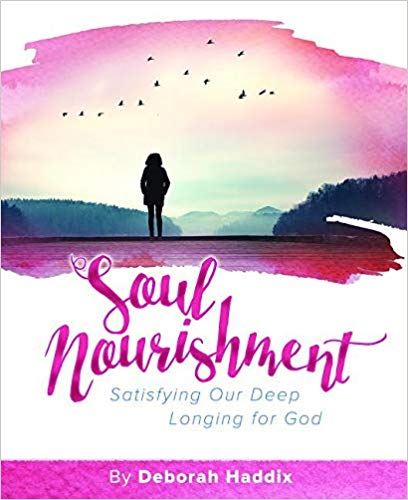8 Life-Giving Ways to Care for Your Soul

Each of us has a living soul. What’s more, this soul is eternal and forms the very foundation of who we are. Operating as our command center, it is our ‘personhood.’
Our soul is the most important part of us. Yet, because it is invisible, we tend to overlook its existence and its health. Left alone, it shrivels.
Each of us, individually, is responsible for the care of our own soul.
Cognizant that it is the very nature of our soul to need, we must become intentional about meeting its needs. Although the needs of our soul are many, meeting its needs does not have to be an overwhelming, burdensome task.
The care of our soul does require our time and attention, but all of our soul’s needs are met in God.
“My soul yearns, even faints, for the courts of the Lord; my heart and my flesh cry out for the living God.” (Psalm 84:2)
Consider these eight refreshing ways to care for your soul:
Photo Credit: GettyImages/Kerkez
1. Schedule a Time of Solitude

1. Schedule a Time of Solitude
SLIDE 1 OF 8
“Then, because so many people were coming and going that they did not even have a chance to eat, he said to them, ‘Come with me by yourselves to a quiet place and get some rest.’” (Mark 6:31)
Have you ever noticed how many times it is recorded that Jesus “went away to a quiet place?” His need for solitude was so great that He even left the crowds and the work behind in order to observe it.
Solitude is the practice of intentionally unplugging, and it allows us to experience God as He restores our soul.
Stepping away for lengthy periods of time serves to rid us of the deterioration of soul that results from constant interaction. In this place of quiet communion, we rediscover our soul.
Additionally, we experience the presence of God and understand once again that He will not compete for our attention.
In his book, An Unhurried Life, Alan Fadling refers to this discipline as “Extended Personal Communion” with God. He chose this term because he says it sounds warmer and more inviting to him than the word ‘solitude.’ Perhaps a renaming will be helpful to you as well.
Photo Credit: Unsplash/Fineas-Gavre
2. Sit in Silence

2. Sit in Silence
SLIDE 2 OF 8
“The LORD is in his holy temple; let all the earth be silent before him.” (Habakkuk 2:20)
In our culture, silence is a rare thing. However, in the Word of God, it is essential.
To observe a time of silence, we must abstain from sound in order to make space for deeper engagement with God. Silence is the practice of drawing away to a quiet place and not speaking in order to quiet the mind and attend to God’s presence.
Photo Credit: Pexels/Brenoanp
3. Abide in Prayer

3. Abide in Prayer
SLIDE 3 OF 8
"Rejoice always, pray continually, give thanks in all circumstances; for this is God’s will for you in Christ Jesus." (1 Thessalonians 5:16-18)
Simply defined, prayer is conversing with God.
In thinking of it as a conversation, however, we need to take care not to assume that we must fill the time with words. Praying is not so much the mustering up of words and energy, as it is a time of joining in with God and His activity.
As you learn to abide in prayer, consider breathing breath prayers throughout the day, praying Scripture, journaling your prayers, or praying in color.
Photo Credit: Thinkstock
4. Practice God’s Presence

4. Practice God’s Presence
SLIDE 4 OF 8
“I keep my eyes always on the LORD. With him at my right hand, I will not be shaken.” (Psalm 16:8)
Practicing the presence of God is about paying attention, and paying attention is difficult in our culture of busyness and noise. Many of us, in fact, have allowed ourselves to get caught up in a way of life that does not set us up to pay attention to the presence of God. We must recognize this and intentionally set about to become ‘noticers’—abandoning ourselves to the presence of God and His working in our lives.
We must learn to live with an ongoing awareness of the living, active, Holy God who has chosen to spend His days with us.
Ideas for Practicing His Presence:
-Meditate on Scripture.
-Memorize Scripture.
-Preach the gospel to yourself.
-Sing songs of praise.
-Set reminder alarms on your phone.
-Post sticky notes around your home.
-Acknowledge His presence by speaking out loud to Him.
-Identify a trigger that when seen or heard will serve to remind you of His love.
Photo Credit: Unsplash/Ben-White
5. Institute 'Grace Breaks'

5. Institute 'Grace Breaks'
SLIDE 5 OF 8
‘Grace Breaks’ are brief times set aside for the purpose of reviewing things that God speaks to you during your morning quiet time together. They provide a much-needed respite for your soul.
How often do we begin our day in sweet communion with our heavenly Father, even to the point of being overcome by something He has revealed to us, only to have it evaporate into the morning fog? Off to care for the things of the day—so much to do, places to be, people demanding our time and energy—and that precious time is never given another thought.
We need time. Time to recall. Time to remember.
Photo Credit: GettyImages/torwai
6. Express Gratitude

6. Express Gratitude
SLIDE 6 OF 8
"Enter his gates with thanksgiving and his courts with praise; give thanks to him and praise his name." (Psalm 100:4)
Gratitude is one of the needs of the soul. Adopting the grateful attitude of Jesus helps the soul thrive.
For the believer in Christ, thanksgiving should be a perpetual and ongoing expression, as natural as breathing.
Ideas for Expressing Gratitude:
-Count gifts—any number (3, 6, 10…) per day.
-Keep a journal by your bed. Record things for which you are thankful before going to sleep each night.
-Frame a pretty sheet of paper behind glass. Using a dry erase marker, begin each day by recording something you are thankful for.
-Photograph things you are grateful for.
-Send thank-you notes.
-Write a thank-you letter to God.
Photo Credit: Unsplash/courtney-hedger
7. Slow Down

7. Slow Down
SLIDE 7 OF 8
“He says, ‘Be still, and know that I am God; I will be exalted among the nations, I will be exalted in the earth.’” (Psalm 46:10)
Jesus is our example, and He knew the power of a rested soul.
Our soul was not designed to run on empty, and sadly, it does not come with a gauge. We must learn to provide our soul with the rest it requires so that it doesn’t become fatigued.
Spend time with a friend, go for a walk, take a nap, set an alarm and pull away from your activity for just five minutes, slow your thoughts, pause as you read Scripture.
Pay attention, savor, reflect. Learn the art of lingering.
Photo Credit: Pixabay/Free-Photos
8. Journal

8. Journal
SLIDE 8 OF 8
Journaling is an invaluable tool for caring for the soul. The process of journaling creates space, focuses our attention, and builds relationship. It invites us to be quiet and still.
Journaling provides rest and helps us be with God.
Ideas for Journaling:
-Record your prayers.
-Journal your thoughts, reflections, and questions as you study Scripture.
-Express your gratitude in a journal.
-Take a journal along when observing times of solitude or silence.
-Write love letters to God.
This list is not, by any means, exhaustive. It is merely a sampling. Use it as a starting point or allow it to spur your own ideas. It doesn’t matter. What matters is spending time with God.
Our soul yearns for Him. It was made to walk with Him.

Photo Credit: Unsplash/Gabrielle-Henderson
Originally published June 04, 2019.









